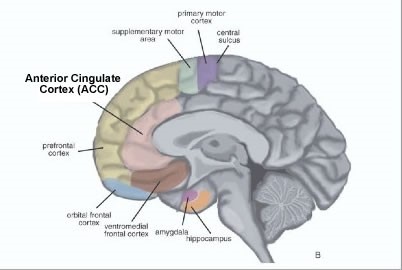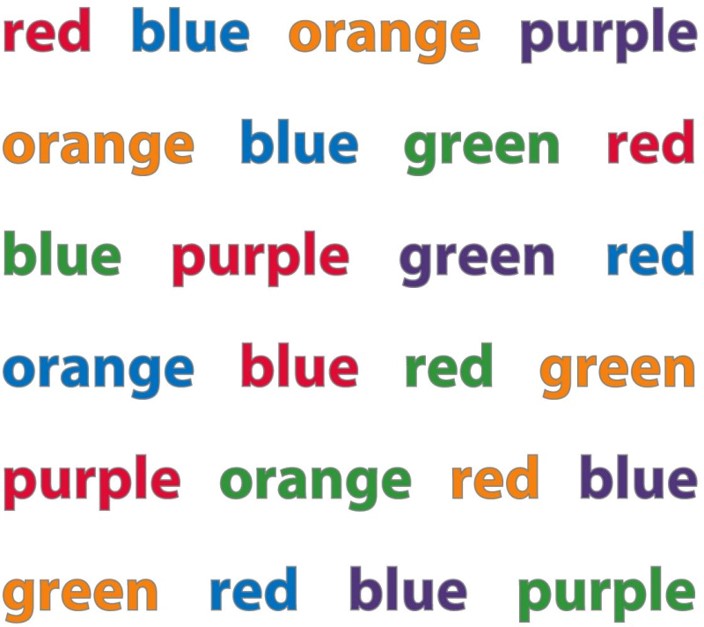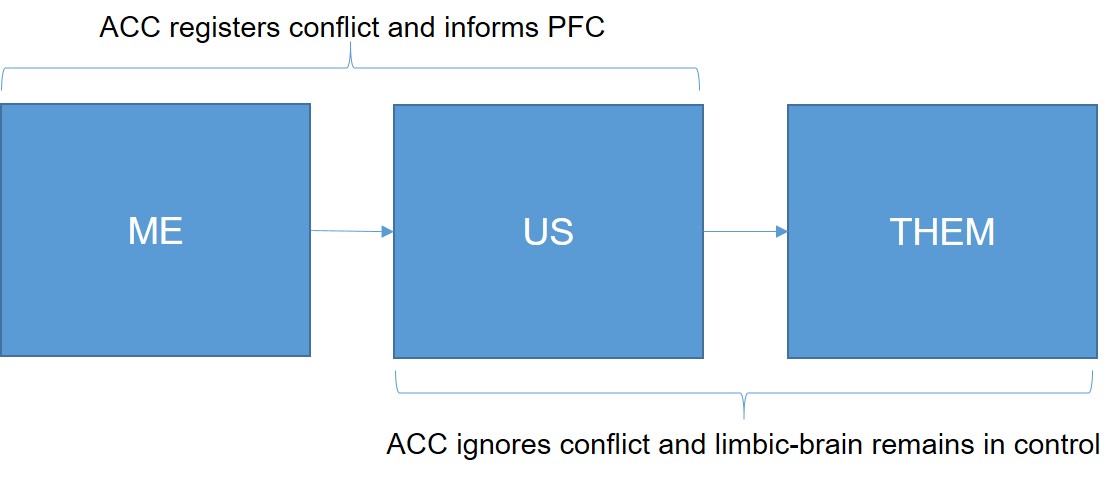The human brain is a thing of wonder. Even more wonderful now I know there’s a bit of it – the Anterior Cingulate Cortex (ACC) – that has the job of identifying conflicts and contradictions. This is pretty important from an innovation perspective. Innovation overwhelmingly starts from conflicts and contradictions. In theory, the ACC ought to help. In practice, it tends not to.
Here’s how I think the story works.
- Most of the decisions in our life get made in our rapid-acting, emotional (limbic) brain. We make decisions for good reasons and real reasons. The ‘real’ reason is the one our limbic brain makes. Then, because this decision can often sound a bit dumb when we try and describe why we made it, along comes our much slower, pre-frontal cortex (PFC) to rationalise the decision and work out what the ‘good’ reason is that we’re going to share with others when they ask us why we just did what we just did.
- The PFC is the part of the brain that does all of our ‘creative’ work. It helps us to analyse a situation, work stuff out and, if we put enough information in and give ourselves enough incubation time, start generating creative solution ideas. Because it has a lot of work to do, it does it much more slowly than our limbic brain.
- Our PFC is triggered to do this creative problem-solving job when our ACC identifies a conflict. Two (or more) pieces of conflicting input data trigger the ACC, and it then passes the conflict to the PFC to be solved.
- There are three important kinds of conflict as far as the way our brain works. Each relates to our prevailing relationship with our surroundings. The first is what might best be described as a ME-versus-ME conflict. This is where we receive different inputs from different sensors that are in some way inconsistent. A classic example is the psychologist’s favourite, the ‘Stroop Test’. This is the test where a poor unfortunate participant is shown lots of words where the meaning of the word and the colour of the writing used sometimes don’t match. Something like this:
The reason we’re often ‘slow’ at working our way through this kind of occasionally-conflicting list is because our ACC has spotted conflicts which require our PFC to unravel.
The second kind of conflict involves ME-versus-US situations. These occur when, for example, my other half tells me that, yes, she’s interested in going to see the new Planet of the Apes movie with me, but all of her body language says she’d actually much rather be pulling out here finger-nails with a pair of rusty pliers. The me-versus-us conflict my ACC registers is that I want to go see the movie and she doesn’t. And so my PFC, very wisely, steps in to solve the conflict. Which means neither of us have been to see the new Planet of the Apes movie, and I have my fingers crossed that it will be showing on my trans-Atlantic plane at the weekend.
The ACC has evolved to be very good at spotting these ME-versus-US conflicts because, from an evolutionary advantage perspective, it’s important to our individual survival that we remain part of the tribe. And remaining part of the tribe means we sometimes – more often than not – have to sacrifice our personal needs and desires for those of the group.
Then comes the third kind of conflict situation: ME-versus-THEM. ‘Them’ being all of those other people that aren’t a part of my tribe. ‘Tribe’ in this context meaning any kind of affinity group that I might wish to feel myself being a part of. Whether it be my family, the millions of fans of Bradford City Association Football Club, left-handed guitarists, ‘European’ or ‘people-in-favour-of-stricter-gun-control’.
Now something strange happens with our ACC. It becomes conflict-blind. Which means that our response to whatever situation we might find ourselves in is going to be driven by our limbic brain and not our rationalising PFC. Thus, if I should find myself in the horrific situation of having a person wearing a Leeds United shirt approach me with a smile on their face, my limbic brain immediately tells me to prepare for trouble. The reality of the situation, when they walk past me and sit at the empty seat at the next table is that a) the subnormal oaf was merely looking for somewhere to drink his coffee, and b) I’m not wearing anything that reveals my own rather more refined footballing tastes, so he didn’t know that I was a THEM. The reality is that I’ve just experienced two conflicts, but my ACC has registered neither and hence my limbic brain is still making all the decisions. That’s why my hackles continued to be up, and I sit there dreading the possibility he might ask me to pass the sugar.
In the bigger scheme of things the Bradford/Leeds version of the US-versus-THEM scenario is pretty trivial. In other words, of course I passed the sugar. At the end of the day, we both turn out to be part of another tribe – the tribe of holidaymakers having the good sense to come and enjoy this café on a drizzly Wednesday afternoon.
On the news tonight, they showed scenes of the protests outside the Trump rally in Phoenix. Some of the protestors were exercising their right to carry arms. I know that, were I to find myself in that situation, my limbic brain would’ve pressed hard on the ‘flight’ button and got me the hell out of there. Guns plus beer plus tear-gas plus 30,000 people thinking with their limbic brains does not feel to me like a winning combination. The only outcome, in fact, is that the two THEM’s are going to be further apart after the evening ended than before it began.
What is happening with these kind of ME-versus-THEM conflict situations is that our limbic brain immediately explains them away by, in effect, saying this situation is outside the tribe, and if it’s outside the tribe then it’s to be expected that things aren’t normal. If it’s outside the tribe, from an evolutionary perspective, it’s all about fight-or-flight and so our PFC has no role to play. And, moreover, is given no role to play by our ACC.
The reason this happens is because there has never been a situation in which there’s been an evolutionary advantage to creatively solving ME-versus-THEM conflicts. And that’s the major flaw. Now we live in our highly complex, highly interdependent modern world, crammed full of US-versus-THEM situations it is all too easy to retreat into our US tribes. Moreover, we retreat automatically. Rather than do what we perhaps ought to do, which is to recognise that Tribe A and Tribe B have different views of the world and that our real – innovation – opportunity is to get past our limbic brains and allow our PFC to see things from that more considered perspective. So that, when they do the same, we can – together – solve the conflict and create solutions where we both win.
I don’t know for sure, but maybe that’s the dominant – ‘first principles’! – societal conflict that needs to be solved right now: we’re trying to live in a 21st Century society armed only with our prehistoric brains and semi-automatic pistols. Maybe, it’s time for our Anterior Cingulate Cortex to step up a gear.



